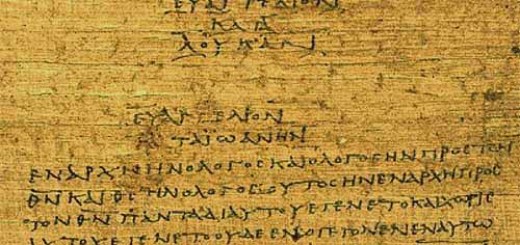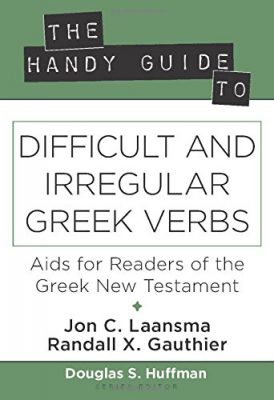 Kregel Publishing sent me a review copy of the book, The Handy Guide to Difficult and Irregular Greek Verbs. As any student of Greek knows, there are numerous Greek verbs that make absolutely no sense when it comes to their principal parts. This handy little book (it’s only 80 pages) pulls all these words together and arranges them by order of frequency.
Kregel Publishing sent me a review copy of the book, The Handy Guide to Difficult and Irregular Greek Verbs. As any student of Greek knows, there are numerous Greek verbs that make absolutely no sense when it comes to their principal parts. This handy little book (it’s only 80 pages) pulls all these words together and arranges them by order of frequency.
In my personal Greek notes, I have a sheet from one of my Greek professors, Dr. Elodie, on “The Dirty Dozen” and another one from Dr. Hoe which contains a larger list. You can download the Cheat Sheet to Irregular Greek Verbs here. I apologize for the scribbles all over these sheets.
The book, of course, is quite helpful, as it provides a much more detailed list of irregular Greek verbs, arranged by frequency, as well as an alphabetical list in the back. There is also a short chapter on the tricky eimi conjugation.
These sorts of guides and cheat sheets are not provided for the purpose of memorizing these difficult words. As the authors point out, after two or three semesters of Greek, the best thing a Greek student can do is simply take out their Greek New Testament and read, read, and read some more. As the student comes across words they do not understand, they should look them up in a Greek lexicon.
Sometimes, however, the student looks up the word in the lexicon, and cannot find it. This is often because the word might be one of the difficult Greek verbs. In this case, a quick and easy guide such as this book, or the cheat sheets above, might be useful. Over time, as the student reads, they will find that they need to refer to these tools less frequently.
So if you are learning Greek, or looking for a good tool to help you learn the difficult and irregular Greek verbs, I recommend you get a copy of this short little book and keep it close by as you read your Greek New Testament.
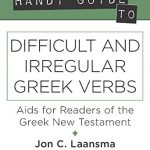

 I was glad that the podcast host pushed back a little bit by asking if the pastor saw any difference between “what the Bible says” and “our understanding of what the Bible says.” The pastor said he did see a difference, but then went on to show by the rest of his comments that he didn’t. He basically said that how he understood the Bible was what the Bible clearly teaches because he lets the Bible and the Bible alone inform his theology, and anybody who disagreed with him was just following their own human understanding of the text imposing their own theology on the text of the Bible.
I was glad that the podcast host pushed back a little bit by asking if the pastor saw any difference between “what the Bible says” and “our understanding of what the Bible says.” The pastor said he did see a difference, but then went on to show by the rest of his comments that he didn’t. He basically said that how he understood the Bible was what the Bible clearly teaches because he lets the Bible and the Bible alone inform his theology, and anybody who disagreed with him was just following their own human understanding of the text imposing their own theology on the text of the Bible.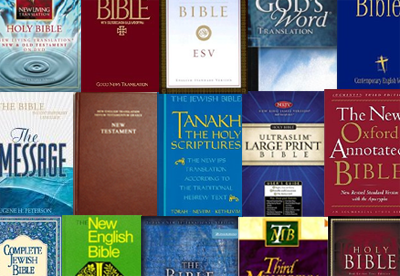
 In fact, there is not even a consensus on how to decide which variant readings are the best. There are two main approaches to the Greek texts, which can be found in the NA/UBS Text and the Majority Text. While the vast majority of scholars today prefer the approach found in the NA/UBS Text, a large number of scholars prefer the approach of the Majority Text. I won’t get into the differences here, because it would bore you to tears. In case you are curious, however, I
In fact, there is not even a consensus on how to decide which variant readings are the best. There are two main approaches to the Greek texts, which can be found in the NA/UBS Text and the Majority Text. While the vast majority of scholars today prefer the approach found in the NA/UBS Text, a large number of scholars prefer the approach of the Majority Text. I won’t get into the differences here, because it would bore you to tears. In case you are curious, however, I 
 And on and on and on …
And on and on and on …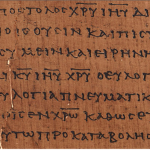
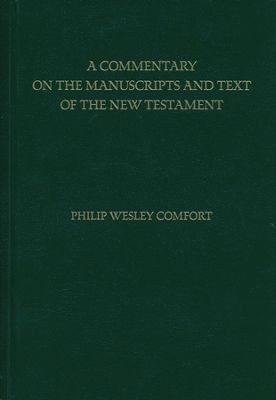 Kregel Publications recently sent me a review copy of Philip Wesley Comfort’s new study resource, A Commentary on the Manuscripts and Text of the New Testament (Get it on
Kregel Publications recently sent me a review copy of Philip Wesley Comfort’s new study resource, A Commentary on the Manuscripts and Text of the New Testament (Get it on 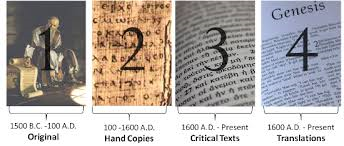
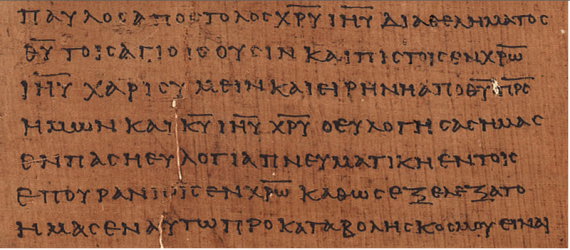
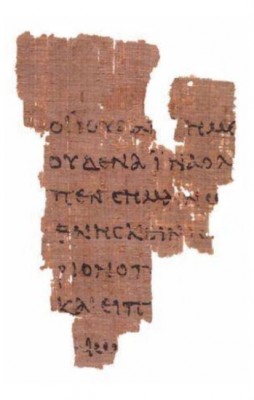 I always knew there were a lot of variants in the Greek manuscripts, but I had forgotten just how many there were. It seems almost every paragraph in the New Testament has a couple. Nevertheless, I sort of assumed that most scholars sort of agreed on what the “major” variants were.
I always knew there were a lot of variants in the Greek manuscripts, but I had forgotten just how many there were. It seems almost every paragraph in the New Testament has a couple. Nevertheless, I sort of assumed that most scholars sort of agreed on what the “major” variants were.